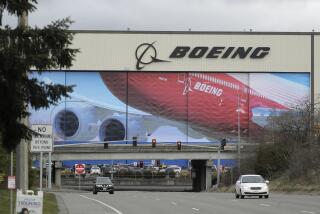Pilots Union Chief Blasts Government Intervention
- Share via
The head of the American Airlines pilots union said Tuesday that Congress should not intervene if the pilots and the airline fail to reach an agreement during the current cooling-off period in their long-festering contract dispute.
Speaking to about 150 American pilots at the Atrium Hotel in Irvine across from John Wayne Airport, Allied Pilots Assn. President Jim Sovich complained that President Clinton harmed their effort when he ordered them back to work Feb. 16, just minutes after they had walked off the job.
“Had Clinton not gotten himself involved, we would have had a contract by now,” Sovich said. He emphasized that the ability to strike still remains the pilots’ greatest leverage to negotiate a contract.
An emergency panel set up by the president to mediate the dispute is set to release its recommendations on Monday. If the company or the union don’t agree to those recommendations, the pilots would have to wait until April 16 to strike.
That is, unless Congress follows the president’s lead and steps in to legislate a contract--a situation Sovich predicts would set a troubling precedent for labor negotiations nationwide.
“Congressional intervention is not good for us,” he said. “It would change the landscape forever. That troubles me.”
Orange County is among several of American’s largest pilot bases that Sovich has visited in recent weeks to speak with the union membership about the status of contract talks. About 1,000 of the APA’s 9,300 pilots are based in Southern California.
American and its pilots have been wrangling over a new contract for more than two years.
The two sides tentatively approved a pact in November, when American offered the pilots a 5% raise over four years plus stock options. But the pilots rejected the offer by a nearly 2-to-1 margin and the union later proposed its members get an 11% pay hike over four years and more stock options.
However, the most critical issue remains who will fly the new, smaller jets that American plans to add to its American Eagle commuter fleet. The company wants them to be flown by American Eagle pilots, who earn, on average, about a third of what American’s jet pilots earn.
“I don’t think you can arbitrate that,” Sovich said.
More to Read
Inside the business of entertainment
The Wide Shot brings you news, analysis and insights on everything from streaming wars to production — and what it all means for the future.
You may occasionally receive promotional content from the Los Angeles Times.










